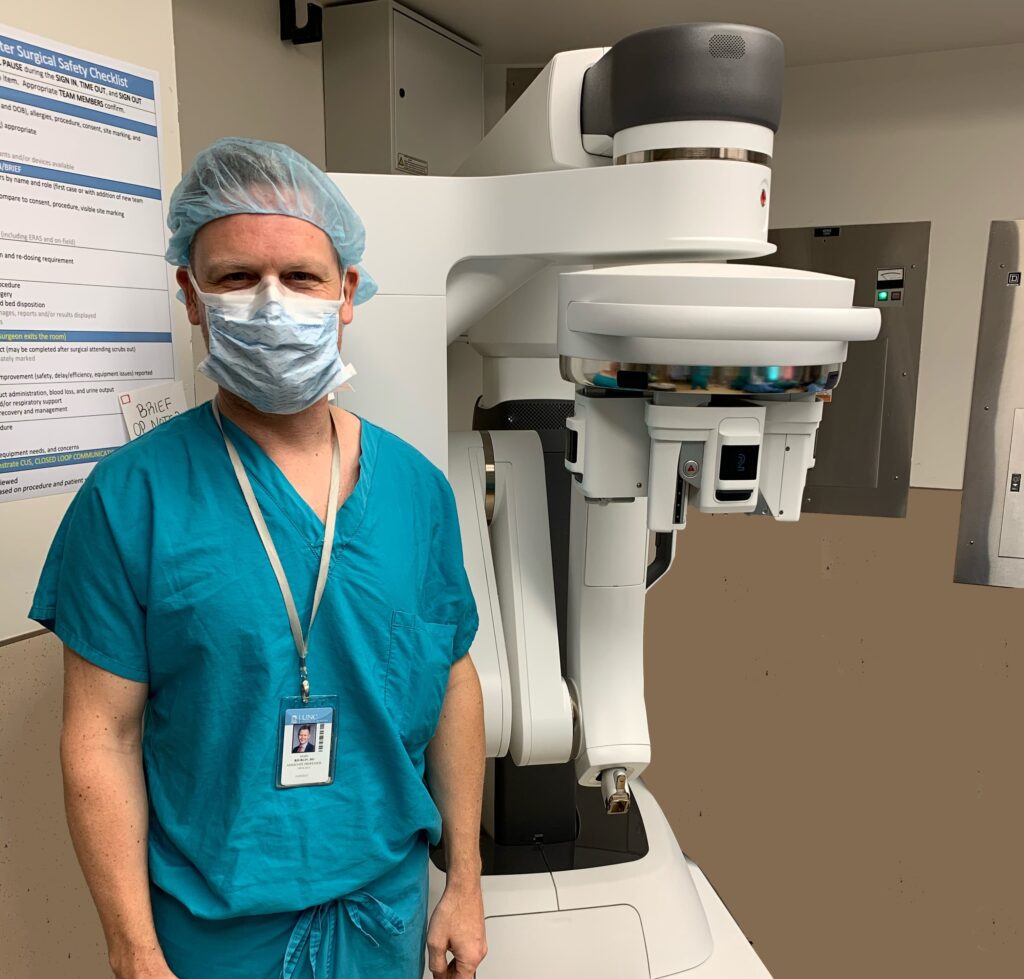
As a teenager in Minnesota, UNC Lineberger’s Marc Bjurlin, DO, MSc, FACOS, was first exposed to surgery when he was in a serious ATV accident, driving the vehicle into a barbed wire fence and ending up with severe lacerations. Despite the trauma he experienced, Bjurlin said it was the first moment he became interested in surgery as a career.
“It was my first experience with medicine and surgery,” he said. “I was admitted to the hospital as a trauma patient and went straight to the OR. I got good care, and it piqued my interest.”
Bjurlin received his medical degree from Midwestern University and completed his residency at the Cook County Hospital in Chicago. After residency, he completed a fellowship in urologic oncology at New York University along with a master’s degree in clinical investigation through the New York University School of Medicine. In 2018, a position at UNC opened up, and Bjurlin and his wife, Maria Fernanda Ochoa Toro, headed south to Chapel Hill.
“I was on staff at NYU, living in a 400-square-foot apartment. I wanted some place with a better lifestyle,” he said. “There was an opening [at UNC] and my skill-set fit what they were looking for. It was a good match.”
Joining the UNC urologic oncology team
Bjurlin has found his niche within the urologic oncology team at UNC Lineberger, and is making his mark through the single port robotic surgery program. Robotic surgery is a form of minimally invasive surgery where surgical instruments are attached to mechanized “arms” that are controlled by a surgeon at a console. The surgeon’s hand movements are then transmitted to the robotic instruments to perform the procedure. The surgeon is able to emulate actual wrist movements using the robotic instruments.
While the robotic surgery program at the North Carolina Cancer Hospital, the clinical home of UNC Lineberger, pre-dated his arrival, Bjurlin has taken it to the next level, using a da Vinci single port surgical device to employ precision techniques in patients with bladder cancer.
Robotic surgery and advances in surgical care

With typical bladder surgery, multiple incisions must be made, which can lead to longer recovery times and more trauma to surrounding tissues for patients. Using the da Vinci single port system, Bjurlin only has to make one incision, and the device allows for just as much access to the abdomen with that one incision as with multiple ones.
“The single incision has the potential to improve outcomes and reduce complications,” he said. “I don’t have to worry about putting four instruments into the abdomen of a patient who has had prior complex abdominal surgery. There is a shorter recovery time and improved cosmetic results, all with a 2.5 cm incision.”
Bjurlin went through specialized training to use the single-port device, honing his skill first by operating on pigs, then putting it into practice with human patients. He’s treated more than 35 cancer patients so far and said he’s been pleased with the results.
“Not every patient needs this type of surgery, but choosing the right patient for the right treatment is part of providing complex cancer care,” he said.
Bjurlin coordinates with UNC Health’s CARES robotic surgery team in deciding which patients are good candidates for the da Vinci surgical device. “We look at whether we can offer added value to patients through robotic surgery, and how do we expand the program to benefit patients and improve outcomes and improve our care. Our multispecialty group vetted the benefit of the single port robot. It’s been well received.”
His skill with the device is also unmatched, and he is often asked to proctor for single port surgery, and he helps train other surgeons across the country to use the device.
Cancer research and collaboration
Bjurlin’s interest in patient care lies outside the operating room, as well. He is actively pursuing research into how smoking traditional cigarettes and e-cigarettes can cause bladder cancer in patients. He’s compared the urine of traditional cigarette smokers with never smokers and e-cigarette smokers, and found that e-cigarette users have carcinogens in their urine, and his work is focused on whether those carcinogens are linked to e-cigarette use.
“Just because there are carcinogens doesn’t mean e-cigarette use causes cancer, but they are detectable, and it’s concerning. It definitely requires further investigation,” he said.
Other research projects include working with a multidisciplinary group, including UNC Lineberger’s William Kim, MD, the Rush Dickson Distinguished Professor, using mouse models to further explore the effects of vaping on bladders in mice. He is also looking at how physicians use imaging to detect and identify stages of bladder cancer, and how artificial intelligence methods can be incorporated into standard imaging, like CT, MRI and PET scans, and use algorithms to spot cancerous anomalies in patients. Bjurlin is also working on 3D virtual reality and printed modeling of kidneys using AI applications to help improve teaching surgical techniques and operation preparation for medical residents.
Bjurlin’s research work across these diverse areas and skill with the single-port robotic surgical device are enhanced by UNC Lineberger’s collaborative environment, and he is supported by his colleagues at every step of the way.
“I think the urologic oncology group is phenomenal,” he said. “The collegiality, the wonderful faculty, staff and residents makes me really happy to come to work. It’s very different from life in New York City. There are good advantages here.”
